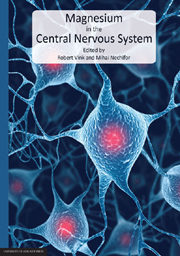Book contents
- Frontmatter
- List of Contributors
- Preface
- Contents
- Section 1 Magnesium in Normal Brain
- Section 2 Magnesium in Neurological Diseases
- Chapter 7 The role of magnesium therapy in learning and memory
- Chapter 8 The role of magnesium in headache and migraine
- Chapter 9 Magnesium in edema and blood-brain barrier disruption
- Chapter 10 Magnesium and hearing loss
- Chapter 11 The role of magnesium in pain
- Chapter 12 The role of magnesium in traumatic CNS injury
- Chapter 13 The use of magnesium in experimental cerebral ischaemia
- Chapter 14 Magnesium in subarachnoid hemorrhage
- Chapter 15 Magnesium in clinical stroke
- Chapter 16 Magnesium in cancer: more questions than answers
- Chapter 17 Magnesium in Parkinson's disease: an update in clinical and basic aspects
- Section 3 Involvement of Magnesium in Psychiatric Diseases
Chapter 7 - The role of magnesium therapy in learning and memory
from Section 2 - Magnesium in Neurological Diseases
Published online by Cambridge University Press: 05 June 2012
- Frontmatter
- List of Contributors
- Preface
- Contents
- Section 1 Magnesium in Normal Brain
- Section 2 Magnesium in Neurological Diseases
- Chapter 7 The role of magnesium therapy in learning and memory
- Chapter 8 The role of magnesium in headache and migraine
- Chapter 9 Magnesium in edema and blood-brain barrier disruption
- Chapter 10 Magnesium and hearing loss
- Chapter 11 The role of magnesium in pain
- Chapter 12 The role of magnesium in traumatic CNS injury
- Chapter 13 The use of magnesium in experimental cerebral ischaemia
- Chapter 14 Magnesium in subarachnoid hemorrhage
- Chapter 15 Magnesium in clinical stroke
- Chapter 16 Magnesium in cancer: more questions than answers
- Chapter 17 Magnesium in Parkinson's disease: an update in clinical and basic aspects
- Section 3 Involvement of Magnesium in Psychiatric Diseases
Summary
Abstract
The old saying “you are what you eat” is becoming increasingly important in the field of neuroscience these days. There is mounting evidence that nutritional factors are beginning to play a major role in cognitive status, or cognitive wellbeing. One of these emerging factors is magnesium (Mg2+). Although the physiological investigation of Mg2+ has a long history, its role in cognitive function is just starting to emerge. The focus of this chapter is to review the available literature on the effects of Mg2+ on cognitive function in the healthy and diseased/injured brain. In addition, data from our laboratory will be presented that has investigated the effects of Mg2+ manipulation on learning and memory tasks in rodents, as well as the ability of Mg2+ therapy to improve cognitive performance in the damaged brain.
Introduction
The purpose of this chapter is to provide a review of the literature on the role of Mg2+ in cognitive function. Although the research on this topic is generally sparse, there is an accumulating body of evidence suggesting that Mg2+ is vitally important. The role that micronutrients play in maintaining and promoting cognitive ability and neural plasticity has started to receive a good deal of attention. A recent paper has provided an excellent review on how various nutrients promote cognitive performance and neural plasticity (Gómez-Pinilla, 2008).
- Type
- Chapter
- Information
- Magnesium in the Central Nervous System , pp. 115 - 124Publisher: The University of Adelaide PressPrint publication year: 2011
- 2
- Cited by

